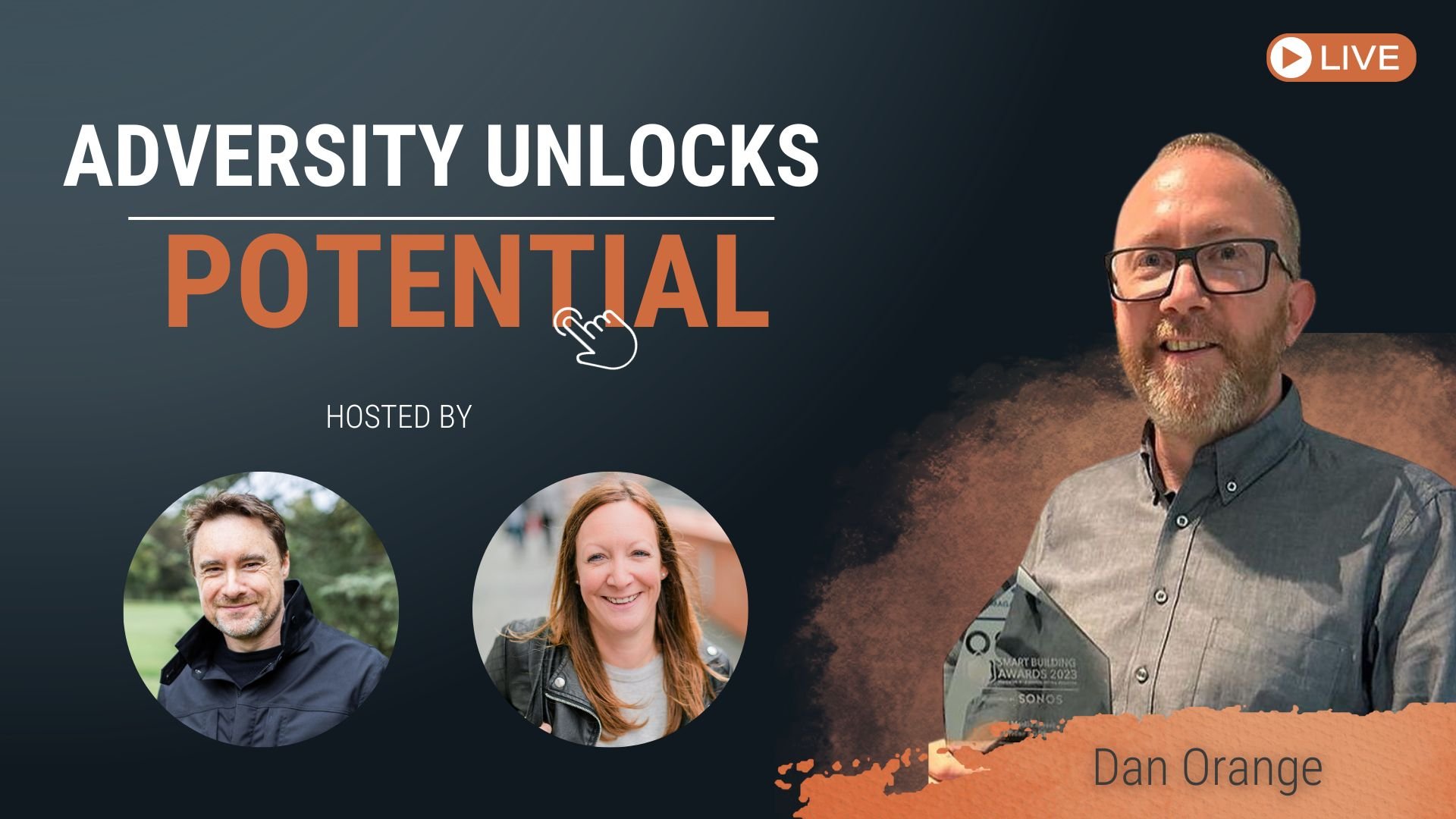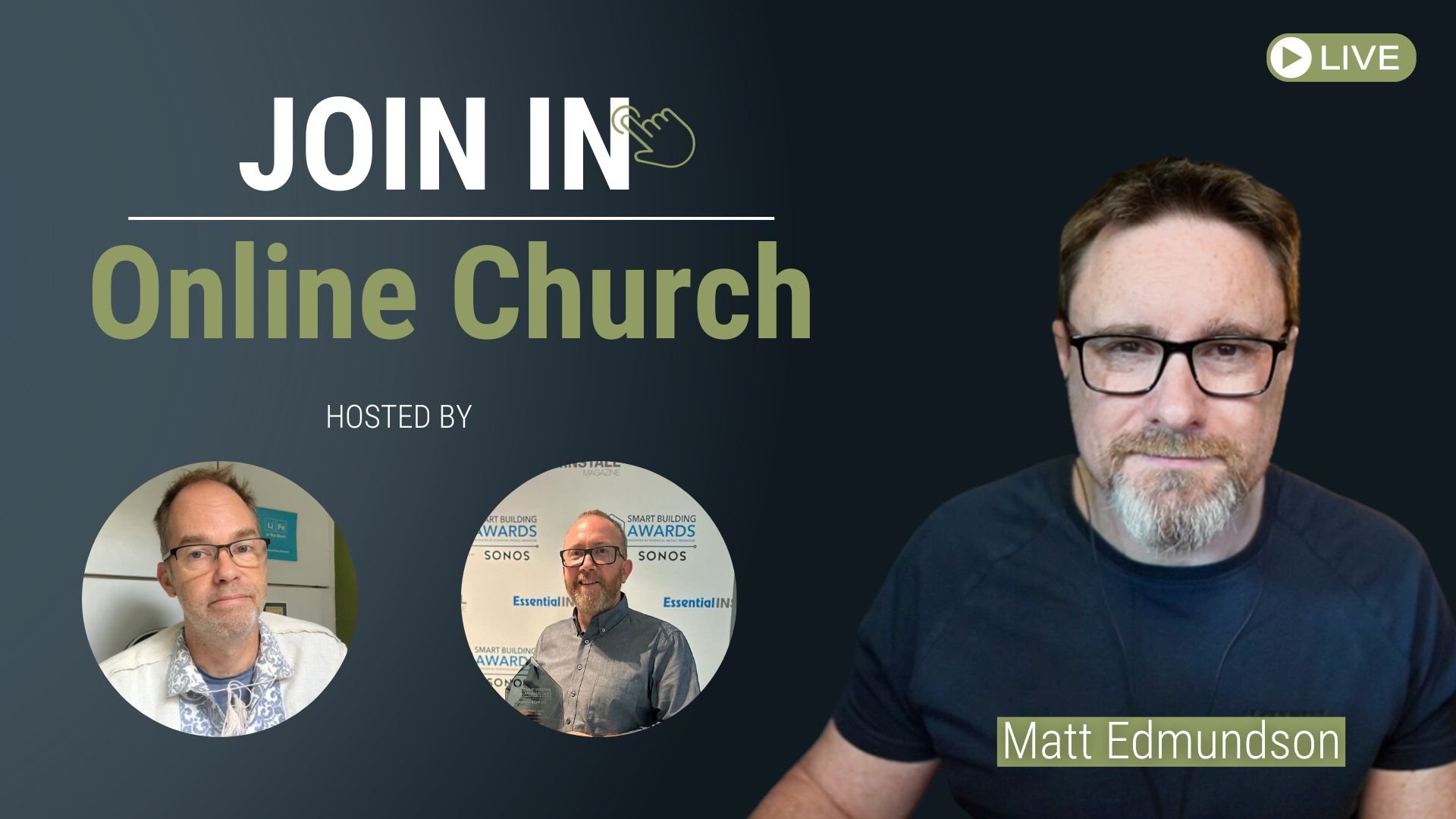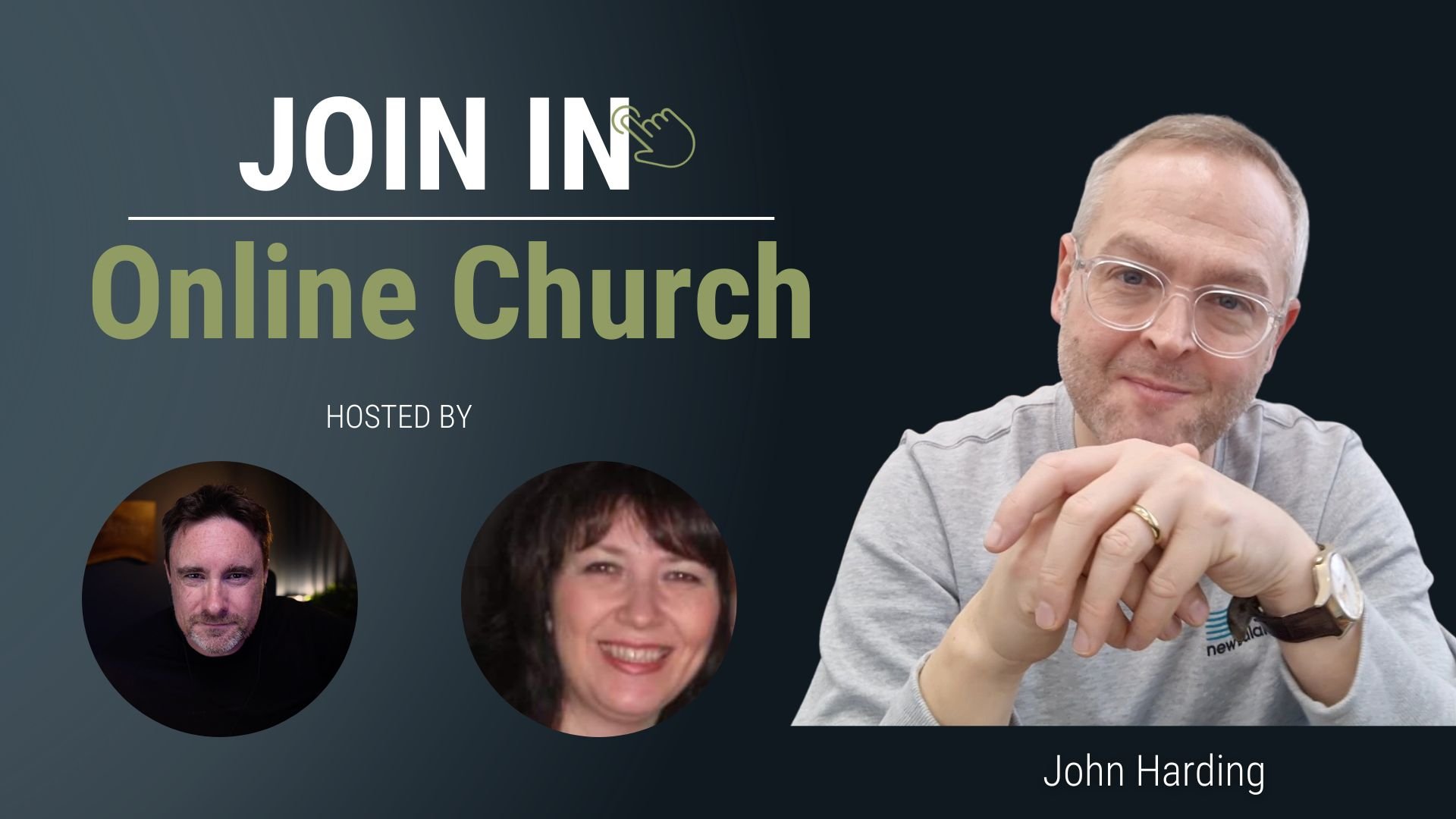The Blind Man Who Saw God
Video Timeline
WELCOME
TALK with Esther Richards
WORSHIP
CONVERSATION STREET with Dan & Anna
The Blind Man who saw God
— Esther Richards
We're gonna be looking today at John 9 and 10. So first let's look at John 9.
Jesus heals a man born blind
“As he passed by, he saw a man blind from birth. And his disciples asked him, “Rabbi, who sinned, this man or his parents, that he was born blind?” Jesus answered, “It was not that this man sinned, or his parents, but that the works of God might be displayed in him. We must work the works of him who sent me while it is day; night is coming, when no one can work. As long as I am in the world, I am the light of the world.” Having said these things, he spit on the ground and made mud with the saliva. Then he anointed the man’s eyes with the mud and said to him, “Go, wash in the pool of Siloam” (which means Sent). So he went and washed and came back seeing.
The neighbors and those who had seen him before as a beggar were saying, “Is this not the man who used to sit and beg?” Some said, “It is he.” Others said, “No, but he is like him.” He kept saying, “I am the man.” So they said to him, “Then how were your eyes opened?” He answered, “The man called Jesus made mud and anointed my eyes and said to me, ‘Go to Siloam and wash.’ So I went and washed and received my sight.” They said to him, “Where is he?” He said, “I do not know.”
They brought to the Pharisees the man who had formerly been blind. Now it was a Sabbath day when Jesus made the mud and opened his eyes. So the Pharisees again asked him how he had received his sight. And he said to them, “He put mud on my eyes, and I washed, and I see.” Some of the Pharisees said, “This man is not from God, for he does not keep the Sabbath.” But others said, “How can a man who is a sinner do such signs?” And there was a division among them. So they said again to the blind man, “What do you say about him, since he has opened your eyes?” He said, “He is a prophet.”
The Jews did not believe that he had been blind and had received his sight, until they called the parents of the man who had received his sight and asked them, “Is this your son, who you say was born blind? How then does he now see?” His parents answered, “We know that this is our son and that he was born blind. But how he now sees we do not know, nor do we know who opened his eyes. Ask him; he is of age. He will speak for himself.” (His parents said these things because they feared the Jews, for the Jews had already agreed that if anyone should confess Jesus to be Christ, he was to be put out of the synagogue.) Therefore his parents said, “He is of age; ask him.”
So for the second time they called the man who had been blind and said to him, “Give glory to God. We know that this man is a sinner.” He answered, “Whether he is a sinner I do not know. One thing I do know, that though I was blind, now I see.” They said to him, “What did he do to you? How did he open your eyes?” He answered them, “I have told you already, and you would not listen. Why do you want to hear it again? Do you also want to become his disciples?” And they reviled him, saying, “You are his disciple, but we are disciples of Moses. We know that God has spoken to Moses, but as for this man, we do not know where he comes from.”
The man answered, “Why, this is an amazing thing! You do not know where he comes from, and yet he opened my eyes. We know that God does not listen to sinners, but if anyone is a worshiper of God and does his will, God listens to him. Never since the world began has it been heard that anyone opened the eyes of a man born blind. If this man were not from God, he could do nothing.” They answered him, “You were born in utter sin, and would you teach us?” And they cast him out.
Jesus heard that they had cast him out, and having found him he said, “Do you believe in the Son of Man?” He answered, “And who is he, sir, that I may believe in him?” Jesus said to him, “You have seen him, and it is he who is speaking to you.” He said, “Lord, I believe,” and he worshiped him. Jesus said, “For judgment I came into this world, that those who do not see may see, and those who see may become blind.” Some of the Pharisees near him heard these things, and said to him, “Are we also blind?” Jesus said to them, “If you were blind, you would have no guilt; but now that you say, ‘We see,’ your guilt remains.”
So in this chapter, we see Jesus healing a man who was born blind. Jesus does this in quite a strange way. He spits on the grounds and makes mud with his saliva and rubs that mud on the man's eyes and sends the man to go to the pool of Siloam to wash, which he did and he was healed. So it's pretty amazing healing.
Then there's this whole kerfuffle about it with the Pharisees afterwards, and they're questioning how it happened. They ask the man who was healed, they ask his parents, they ask the man who was healed again, and in the end, it becomes a conversation about who Jesus actually is.
Who is this Jesus?
The Pharisees are saying that surely Jesus cannot be from God because the day that he performed this healing was the Sabbath day or the Jewish Holy Day when they're not supposed to do any work, and they reckon that healing somebody counts as work. So if he doesn't keep the Sabbath, then surely he's a sinner. Surely he can't be from God.
The parents of the man, when asked are too afraid to say who they think Jesus is in case they get cast out of the synagogue. So the man who was healed then explains what he knows and what his experience has been. And he does that in verses 25 to 33 where he says, Whether he is a sinner I do not know. One thing I do know, that though I was blind, now I see. And then he continues to talk about why he thinks who Jesus is who he says he is. He says, we've never seen a man who's been blind from birth be able to see again, people can't do that surely. And we know that God speaks to his people and speaks to good people. So he uses his own logic to see what he knows, see what he's experienced, and understand who Jesus is, who he believes Jesus has revealed himself to be.
So this gets him cast out of his synagogue and Jesus hears about this and goes to talk to him, and Jesus then explains to the man who he is, which is in verses 35 to 38.
“Jesus heard that they had cast him out, and having found him he said, “Do you believe in the Son of Man?” He answered, “And who is he, sir, that I may believe in him?” Jesus said to him, “You have seen him, and it is he who is speaking to you.””
Jesus is basically saying, It's me. I'm here. You've seen me, you can hear me. And the Pharisees got so caught up in the law and all the technicalities, ticking the boxes and getting the days right that they miss Jesus.
Don't get caught up. Don't get distracted by religion, by ticking boxes, by trying to get everything right. And miss who Jesus really is and who he's calling you to be.
He has already revealed himself to you. The whole of the Bible is Jesus revealing himself and his nature. You have seen him. It is he who is speaking to you. That is relevant for all of us even now.
Being a witness
We can also learn a whole lot from the response of the no-longer-blind man. The way the man responds to the questioning of the Pharisees is a really beautiful example of being a witness. We know that we are called to be witnesses to Jesus and to who Jesus is, and we see it many times in the Bible.
To give you a few examples, we see it a few times in Acts in chapter 1, verse 8, which says,
“But you will receive power when the Holy Spirit has come upon you, and you will be my witnesses in Jerusalem and in all Judea and Samaria, and to the end of the earth.”
We see it again in Acts chapter 22, verse 15, which says,
“for you will be a witness for him to everyone of what you have seen and heard.”
And earlier we see it in Isaiah 43, verse 10,
““You are my witnesses,” declares the Lord, “and my servant whom I have chosen, that you may know and believe me and understand that I am he. Before me no god was formed, nor shall there be any after me...you are my witnesses,” declares the Lord...”
So we're told to be witnesses for Jesus and it's a vital part of God's mission of what he's calling us to.
But how do we do that?
Well, Acts 4:20 tells us a little bit about how to do this very briefly and simply, but in a really simple and easy-to-understand way. It says,
“for we cannot but speak of what we have seen and heard.”
That's it. That's all it takes to be a witness is to speak of what we see and what we hear.
So Acts 4 tells us how to do it. And the man in this story in John's gospel shows us how to do it. Because in verse 25, he says very simply, One thing I do know, that though I was blind, now I see. He even admits that he doesn't know the full extent of everything. He says, "whether he is a sinner I do not know." He doesn't take a long time researching and trying to make sure that he knows all the answers and has all the understanding and all the technical words and everything worked out perfectly.
He just says what he knows and what he's experienced, and that's what it means to be a witness. That is what we are called to do as well, to be a witness. And this man is an excellent example of that.
The Good Shepherd
So let's move on to John chapter 10, which is a brilliant chapter. It's a classic, you probably heard many parts of it before. It's titled, I Am The Good Shepherd. I'm gonna especially focus on that aspect of it, of Jesus being the good shepherd. This is what it says,
““Truly, truly, I say to you, he who does not enter the sheepfold by the door but climbs in by another way, that man is a thief and a robber. But he who enters by the door is the shepherd of the sheep. To him the gatekeeper opens. The sheep hear his voice, and he calls his own sheep by name and leads them out. When he has brought out all his own, he goes before them, and the sheep follow him, for they know his voice. A stranger they will not follow, but they will flee from him, for they do not know the voice of strangers.” This figure of speech Jesus used with them, but they did not understand what he was saying to them.
So Jesus again said to them, “Truly, truly, I say to you, I am the door of the sheep. All who came before me are thieves and robbers, but the sheep did not listen to them. I am the door. If anyone enters by me, he will be saved and will go in and out and find pasture. The thief comes only to steal and kill and destroy. I came that they may have life and have it abundantly.
I am the good shepherd. The good shepherd lays down his life for the sheep. He who is a hired hand and not a shepherd, who does not own the sheep, sees the wolf coming and leaves the sheep and flees, and the wolf snatches them and scatters them. He flees because he is a hired hand and cares nothing for the sheep. I am the good shepherd. I know my own and my own know me, just as the Father knows me and I know the Father; and I lay down my life for the sheep.
And I have other sheep that are not of this fold. I must bring them also, and they will listen to my voice. So there will be one flock, one shepherd. For this reason the Father loves me, because I lay down my life that I may take it up again. No one takes it from me, but I lay it down of my own accord. I have authority to lay it down, and I have authority to take it up again. This charge I have received from my Father.”
There was again a division among the Jews because of these words. Many of them said, “He has a demon, and is insane; why listen to him?” Others said, “These are not the words of one who is oppressed by a demon. Can a demon open the eyes of the blind?”
At that time the Feast of Dedication took place at Jerusalem. It was winter, and Jesus was walking in the temple, in the colonnade of Solomon. So the Jews gathered around him and said to him, “How long will you keep us in suspense? If you are the Christ, tell us plainly.” Jesus answered them, “I told you, and you do not believe. The works that I do in my Father’s name bear witness about me, but you do not believe because you are not among my sheep. My sheep hear my voice, and I know them, and they follow me. I give them eternal life, and they will never perish, and no one will snatch them out of my hand. My Father, who has given them to me,[a] is greater than all, and no one is able to snatch them out of the Father’s hand. I and the Father are one.”
The Jews picked up stones again to stone him. Jesus answered them, “I have shown you many good works from the Father; for which of them are you going to stone me?” The Jews answered him, “It is not for a good work that we are going to stone you but for blasphemy, because you, being a man, make yourself God.” Jesus answered them, “Is it not written in your Law, ‘I said, you are gods’? If he called them gods to whom the word of God came—and Scripture cannot be broken— do you say of him whom the Father consecrated and sent into the world, ‘You are blaspheming,’ because I said, ‘I am the Son of God’? If I am not doing the works of my Father, then do not believe me; but if I do them, even though you do not believe me, believe the works, that you may know and understand that the Father is in me and I am in the Father.” Again they sought to arrest him, but he escaped from their hands.
He went away again across the Jordan to the place where John had been baptizing at first, and there he remained. And many came to him. And they said, “John did no sign, but everything that John said about this man was true.” And many believed in him there.”
So in chapter 10, Jesus says that he is the good shepherd. That he is the good shepherd who will lay down his life for his sheep. And actually, it talks about how he chooses to lay down his life for his sheep. He says no one takes it from me. He's talking about laying down his life and giving up his life.
He says, No one takes it from me, but I lay it down of my own accord. Jesus was not forced to die. He was not made to do it. He wasn't bribed into it. He chose to die for you. It was always his choice. It was always in his control whether he wanted to do it. He says that he had the authority to lay his life down, and that's what it talks about in verse 18. This is clearly talking about what Jesus did on the cross, that he chose to die for you. Jesus always had a choice and he chose you. He desires to know you. Later in the chapter, he tells us that it is he who gives us eternal life and no one can take that away.
Verse 27 says, My sheep hear my voice and I know them and they follow me. And this is really similar to the part in the last chapter where Jesus reveals himself to the healed man where he says, It is me. It's he who has been speaking to you, and the man believes and worships, he hears his voice and follows him.
This is a really clear call as to who we are supposed to be and what we are supposed to do in response to Jesus' calling to us. Jesus is constantly revealing himself to us in the Bible, and this can be our only response - to hear. To listen, to believe, and to follow him. To fall down in worship.
Conclusion
Lastly, I just wanted to make a brief, very quick link between these two chapters. In chapter nine, Jesus heals and reveals himself to one man. And in chapter 10, he is talking about his devotion to the whole flock of sheep.
Jesus knows and loves us all as a group, every single one of us together. But he also knows and loves you as a distinct individual.
He is always revealing himself to us because he wants us. He wants to know you, and he wants you to know him. Pay attention. Don't get caught up by other things. Know that you are loved, and be a witness to everything he is doing for you.
CONVERSATION STREET
With: Dan Orange & Anna Kettle
What is Conversation Street?
Conversation Street is part of our live stream, where the hosts (in this case, Dan & Anna) chat through Esther's talk and answer questions that were sent in through the live stream. You can watch the conversation in the video, it starts 27 mins 52 s into the live stream, or you can go straight there by clicking here. This week’s questions and topics of conversation are:
What stood out to you from the talk?
How can we miss Jesus because of our biases or narrow views of church and religion?
Why did Jesus choose to die for us even though he had a choice not to?
God is at work in places where we least expect him. What are some of the areas where we can pay attention to God?
How does technology and always being "online" distract us from what is in front of us? How can we make space for God in our lives?
Why did Jesus risk his life trying to heal the blind man?
How is Jesus God of all of us yet a personal God and reveals himself to us as individuals?
More Bible verses on Jesus
Matthew 14:14 - When He went ashore, He saw a large crowd, and felt compassion for them and healed their sick.
Matthew 14:36 - and they implored Him that they might just touch the fringe of His cloak; and as many as touched it were cured.
Matthew 15:30 - And large crowds came to Him, bringing with them those who were lame, crippled, blind, mute, and many others, and they laid them down at His feet; and He healed them.
Acts 10:38 - You know of Jesus of Nazareth, how God anointed Him with the Holy Spirit and with power, and how He went about doing good and healing all who were oppressed by the devil, for God was with Him.
Isaiah 53:5 - But he was pierced for our transgressions, he was crushed for our iniquities; the punishment that brought us peace was on him, and by his wounds we are healed.
Isaiah 40:11 - Like a shepherd He will tend His flock, In His arm He will gather the lambs and carry them in His bosom; He will gently lead the nursing ewes.
Hebrews 13:20 - Now the God of peace, who brought up from the dead the great Shepherd of the sheep through the blood of the eternal covenant, even Jesus our Lord,
Psalm 95:7 - For He is our God, and we are the people of His pasture and the sheep of His hand.
Luke 12:32 - Do not be afraid, little flock, for your Father has chosen gladly to give you the kingdom.
Acts 20:28,29 - Be on guard for yourselves and for all the flock, among which the Holy Spirit has made you overseers, to shepherd the church of God which He purchased with His own blood. I know that after my departure savage wolves will come in among you, not sparing the flock;














